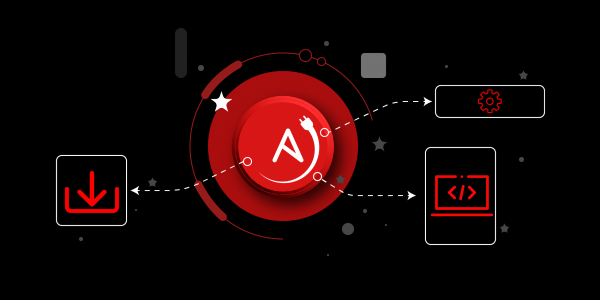Overview: Install and Configure Ansible plug-ins for Red Hat Developer Hub on Developer Sandbox
In today’s fast-paced IT landscape, streamlining automation development workflows is paramount. The Red Hat Developer Hub (RHDH) offers an innovative framework for building internal developer portals (IDPs), providing a unified experience that reduces cognitive load and significantly boosts developer productivity.
We recently announced the technical preview of Ansible plug-ins for Red Hat Developer Hub, an integration of Ansible Automation with RHDH that heralds a new era for Ansible users by enabling a seamless, efficient, and powerful automation platform experience for automation developers. This union provides a comprehensive platform that offers self-service workflows, guided enablement, and standardized best practices, enabling a robust Community of Practice (COP) for automation in your organization.
Who benefits from Ansible plugins for RHDH?
Individual content creators (automation developers)
For individual creators, particularly those new to automation, getting started with Ansible can be challenging. The Ansible plug-ins for RHDH address these challenges by providing a centralized UI that collates all necessary learning paths, project templates, documentation, and more to make onboarding smoother and more intuitive. Automation developers can quickly discover existing Ansible content and align with their organizational policies, accelerating their journey from novice to proficient.
Automation specialists
Automation specialists and domain experts, who often act on behalf of their organizations, will find immense value in this integration. They need their automation to be easily discoverable, distributable, and consistently executable across the organization. Ansible plug-ins for RHDH reduce the need to switch between multiple tools, thereby saving time and enhancing the quality of the Ansible content created. This integration ensures that automation is standardized and adheres to best practices, including CI/CD and testing, promoting a consistent approach to automation across the enterprise.
Addressing core organizational challenges
Improve time-to-value
One of the principal challenges customers face with automation is realizing time-to-value as quickly as possible. Success with Ansible Automation Platform hinges on the effective creation of Ansible content such as playbooks, roles, and collections, then standardizing and sharing this content across different teams. Ansible plug-ins for RHDH delivers a platform engineering approach to creating, managing, and scaling quality Ansible content beyond an individual user to the entire IT organization.
Streamline disparate tooling
Creating Ansible content often involves using various tools such as integrated development environments (IDEs) and Git, each with its own interface. The fragmented nature of these tools requires constant context switching, which can slow down development. Ansible plug-ins for RHDH offer a centralized interface, bringing all necessary tools together. This streamlines the development process and ensures that documentation is consistent and easily accessible, reducing the time developers spend searching for information.
Enhance discoverability and reusability
Organizations often have a wealth of Ansible content that is purpose-built and tested for reuse. With this in mind, RHDH provides a centralized catalog that tracks ownership and metadata, making it easier for developers to find and reuse existing automation resources. Reusing existing resources promotes the standardization of automation content and discourages the use of untested, one-off automation scripts.
Prerequisites:
- A GitHub account
- Red Hat Developer Hub installed on Developer Sandbox.
- A valid subscription to Red Hat Ansible Automation Platform
- Basic knowledge of Kubernetes and Helm
In this learning path, you will:
- Set up your free Developer Sandbox.
- Install and configure RHDH on the Developer Sandbox
- Setup and configure Ansible plug-ins for RHDH on the Developer Sandbox.
- Setup OpenShift Dev Spaces in your Developer Sandbox.
- Verify installation and use Ansible plug-ins for Red Hat Developer Hub.

